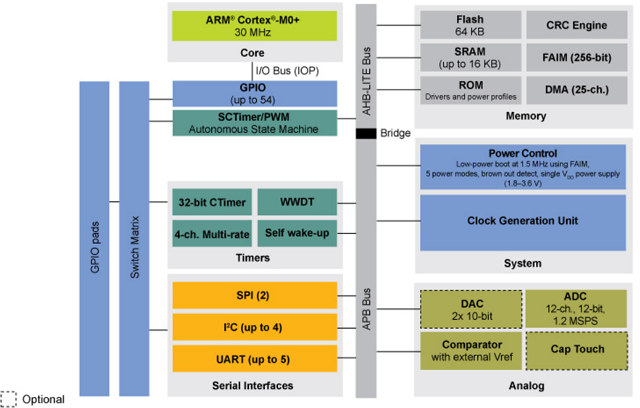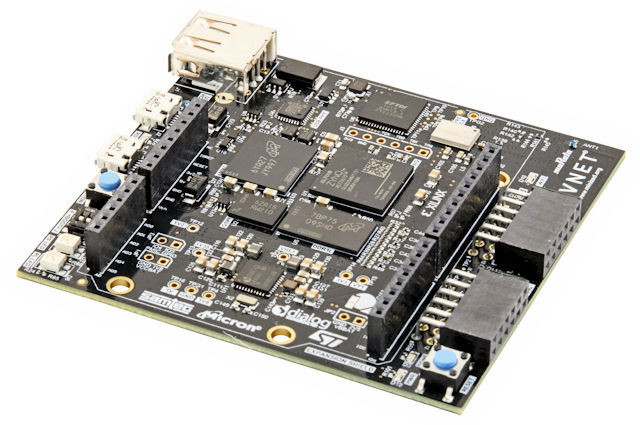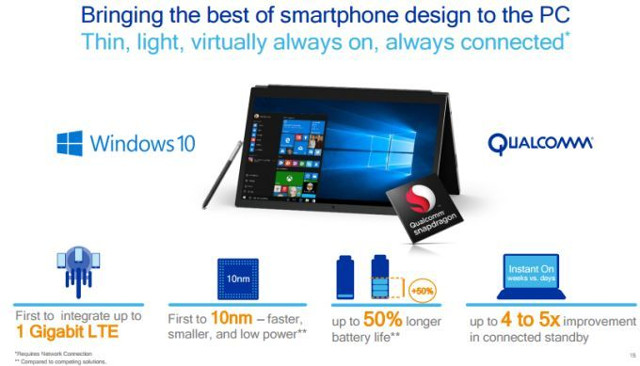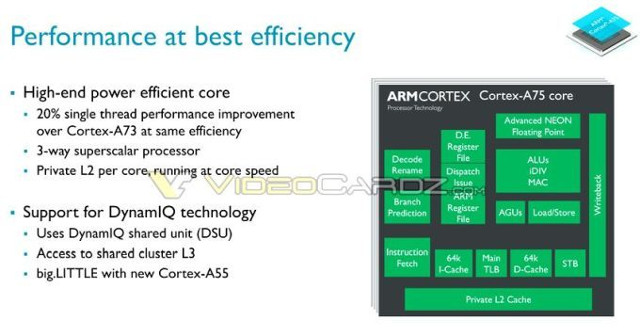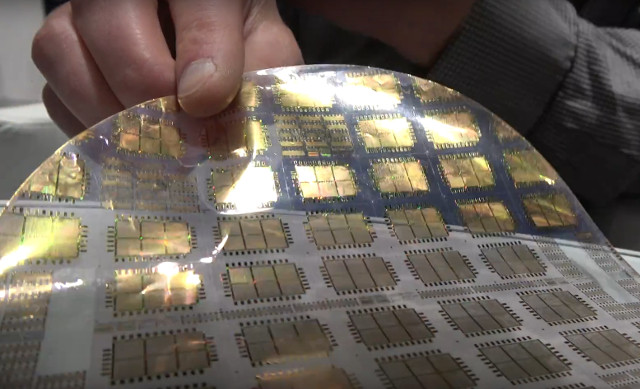Linus Torvalds has just released Linux 4.12: Things were quite calm this week, so I really didn’t have any real reason to delay the 4.12 release. As mentioned over the various rc announcements, 4.12 is one of the bigger releases historically, and I think only 4.9 ends up having had more commits. And 4.9 was big at least partly because Greg announced it was an LTS kernel. But 4.12 is just plain big. There’s also nothing particularly odd going on in the tree – it’s all just normal development, just more of it that usual. The shortlog below is obviously just the minor changes since rc7 – the whole 4.12 shortlog is much too large to post. In the diff department, 4.12 is also very big, although the reason there isn’t just that there’s a lot of development, we have the added bulk of a lot of new header files […]
NXP Unveils LPC84x ARM Cortex M0+ MCU Family, and LPCXpresso845-MAX Evaluation Board
NXP Semiconductors has expanded LPC800 series MCUs with the new LPC84x family of 32-bit ARM Cortex-M0+ microcontroller said to offer 10 times the performance, three times more power saving savings, and 50 percent smaller code-size than 8- or 16-bit microcontrollers. Key features of LPC84x MCU family (LPC844 / LPC845): MCU Core – ARM Cortex-M0+ core @ 30 MHz with advanced power optimization RAM – 16 kB RAM (Logic for Bit banding across all of SRAM) Storage – 64 kB Flash, small 64-byte page size suitable for EEPROM emulation Peripherals Timers – 32-bit CTimer, WWDT, 4-channel multi-rate, SCTimer/PWM Serial Interfaces – Up to 4x I2C, 2x SPI, up to 5x UART Analog Interfaces – 12 ch, 12-bit ADC up to 1.2 Msps; 2x 10-bit DAC; comparator with external Vreg; 9-channel capacitive touch interface working in sleep and deep sleep modes Up to 54 GPIOs 25-ch DMA offloads core Power Control Five […]
$89 MiniZed Development Board based on Xilinx Zynq Z-7007S SoC Includes WiFi, Bluetooth, Arduino Headers
Avnet has unveiled MiniZed development board – part of ZedBoard family – powered by a Xilinx Zynq Z-7007s SoC with an ARM Cortex A9 processor and FPGA fabric, supporting WiFi and Bluetooth connectivity, and equipped with Arduino and PMOD headers. MiniZed board (AES-MINIZED-7Z007-G) specifications: SoC – Xilinx Zynq-7007S single ARM Cortex A9 processor up to 677 MHz + FPGA with 23K logic cells, 1.8 Mb block RAM, 60 DSP slices System Memory – 512 MB DDR3L Storage – 8 GB eMMC flash, 128 Mbit QSPI flash Connectivity – Wi-Fi 802.11b/g/n and Bluetooth 4.1 plus EDR and BLE via Murata “Type 1DX” wireless module USB – 1x USB 2.0 host port Sensors – 3-axis accelerator and temperature sensor (LIS2DS12); Digital Microphone (MP34DT05) Expansion Interfaces: 2x Pmod compatible connectors with 16x GPIOs Arduino UNO R3 compatible header with 22x GPIOs Debugging – JTAG and serial console via micro USB port Misc – 2x […]
Samsung S-Patch3 Wearable Health Tracker Based on Samsung Bio-Processor Hits the FCC
At the end of 2015, Samsung unveiled their S3FBP5A Bio-Processor comprised of an ARM Cortex-M4 MCU, a DSP, and sensors for PPG, ECG (electrocardiography), Skin temperature, BIA, and GSR to have a single package to design tracker able to monitor your health condition. The company demonstrated an early prototype called S-Patch at CES 2016 (See embedded video at the end of this post), and now S-Patch3 wearable health monitoring system has just hit the FCC. The system has two round shapes case connected via a cable, with one for the battery compartment, and the other containing the Bio Processors, and meant to be placed on your chest. The device can then synchronize the data with your smartphone in real-time over Bluetooth. People with heart conditions may benefit from the system, as if they wish to do so, they could share the data with their doctor. Few documents are publicly available […]
Windows 10 ARM Mobile PCs Demonstrated with Qualcomm Snapdragon 835 SoC at Computex 2017
Windows on ARM has been tried before with Windows RT, but the systems were crippled, and it was not exactly a success. Microsoft and Qualcomm are now giving it another try with ARM mobile computers running the full version Windows 10 on Qualcomm Snapdragon 835 processor, and Asus, HP, and Lenovo building devices based on the solution. There are plenty of inexpensive Intel PCs running Windows 10, so what would be the benefits of using Snapdragon 835 SoC? Qualcomm explains that it’s the first to coming integrate Gigabit LTE, it offers up to 50% longer battery life in specific use cases like watching videos and gaming, and thanks to big.LITTLE technology provides up to 4 to 5 times improvement in battery life compared to Intel’s solutions. Windows 10 does not have the same limitations as Windows RT had, and you can do pretty everything that you would on an Intel […]
ARM Cortex-A75 & Cortex-A55 Cores, and Mali-G72 GPU Details Revealed
We’ve already seen ARM Cortex A75 cores were coming thanks to leak showing Snapdragon 845 SoC will feature custom Cortex A75 cores, but we did not have many details. But since we live in a world where “to leak is glorious”, we already have some slides originally leaked through VideoCardz with the post now deleted, but Liliputing & TheAndroidSoul got some of the slides before deletion, so let’s see what we’ve got here. ARM Cortex A75 So ARM Cortex-A75 will be about 20% faster than Cortex A73 for single thread operation, itself already 30% faster than Cortex A72. It will also be the first DynamIQ capable processor together with Cortex A55 with both cores potentially used in big.LITTLE configuration. Cortex A75 performance is only better for peak performance, and remain the same as Cortex-A73 for sustained performance. The chart above does not start at zero, so it appear as though […]
ARM Chromebooks Run Android Apps Better, Exhibit Longer Battery Life than Intel Chromebooks (Study)
Google has been working on supporting Android apps and the Play Store on Chromebooks, which are normally sold with either ARM or Intel processors. So the ability to run Android apps well is one of the things to consider before purchasing a Chromebook. Shrout Research has published a paper entitled “Chromebook Platform Choice Important for Android App Performance” comparing an Acer Chromebook R13 with a Mediatek MT8173C ARM Cortex A72/A53 processor to Acer Chromebook R11 with an Intel Celeron N3060. The Intel Chromebook has a smaller resolution so this could be an advantage, so less resources are needed to update the display. However, the ARM processor is significantly more powerful than the Intel one according to GeekBench results, and Chromebook R13 is sold for $399 on Amazon US, while Chromebook R11 goes for $299 (and lower during promotions). So it’s not a perfect comparison, but it should give an idea […]
PragmatIC Manufactures Ultra Thin and Flexible Plastic Electronics Circuit, Plastic ARM Cortex M0 MCU Coming Soon
Electronics manufacturing now relies on silicon wafers, and it works great for many applications. However, some other applications require or benefit from a cheaper price, thinner circuits, and flexibility, and PragmatIC addresses all those three issues with technology to print electronics circuits on plastic sheets. The technology is said to costs less than 1/10th cost of silicon, with the circuit printed on 10 μm thick flexible plastic “wagers” with support for 10 layers. Circuit starts from basic gates up to ARM Cortex M0/M0+ chip as shown above. Simpler circuits are currently sold for as low as $0.01, but the area for Cortex M0 MCU is 1cm2, and a bit too big for commercial applications, so they plan on shrinking the process to make it commercial viable. ARM is an investor in the company, and PragmatIC is ramping production capacity with the ability to manufacture on billion plastic chips/circuits in 2018. […]



